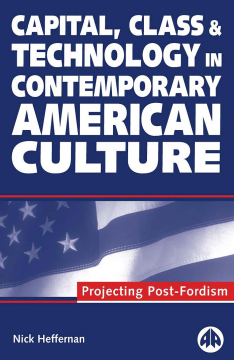
Additional Information
Book Details
Abstract
In the tradition of Mike Davis and Fredric Jameson, Nick Heffernan engages in a series of meditations on capital, class and technology in contemporary America.
He turns to the stories we generate and tell ourselves - via fiction, film journalism, theory - to see how change is registered. By investigating a variety of texts, he observes how structural change affects the way people organise their lives economically, socially and culturally. Case studies include Ridley Scott's Blade Runner, William Gibson's cyberspace trilogy, Thomas Pynchon's The Crying of Lot 49, and Wim Wenders's Until the End of the World.
Using the links between narrative cultural forms and the process of historical understanding, he brings together debates that have so far been conducted largely within the separate domains of political economy, social theory and cultural criticism to provide a compelling analysis of contemporary cultural change. By relocating postmodernism in the context of changing modes of capitalism, Heffernan puts the question of class and class agency back at the centre of the critical agenda.
'Draws on an impressive breadth of texts, ranging from the usual suspects of post-modern social, cultural, and literary theory to an intriguing selection of films and novels, including some recent cyberpunk science fiction. The result is an eclectic analysis of the often ambiguous and anxious position of the professional middle class in the midst of a period of historic transformation, cybernation, and globalisation'
Choice
Table of Contents
| Section Title | Page | Action | Price |
|---|---|---|---|
| Contents | v | ||
| Introduction | 1 | ||
| Part 1. Late Capitalism, Fordism, Post- Fordism | 11 | ||
| Notes | 216 | ||
| Introduction | 216 | ||
| Chapter 1 | 217 | ||
| Chapter 2 | 218 | ||
| Chapter 3 | 219 | ||
| Chapter 4 | 220 | ||
| Chapter 5 | 222 | ||
| Chapter 6 | 222 | ||
| Chapter 7 | 224 | ||
| Chapter 8 | 225 | ||
| Chapter 9 | 226 | ||
| Chapter 10 | 226 | ||
| Chapter 11 | 228 | ||
| Conclusion | 229 | ||
| 1. Postmodernism and Late Capitalism | 13 | ||
| Periodisation and the Break | 13 | ||
| Late Capitalism: A New Stage of Capital? | 15 | ||
| Limits to Late Capitalism | 22 | ||
| Regimes of Accumulation and Modes of Regulation: Fordism | 24 | ||
| Consumption and the Wage Relation | 25 | ||
| Crises of Accumulation: Post- Fordism | 27 | ||
| Notes | 217 | ||
| 2. Class and Consensus, Ideology and Technology | 29 | ||
| Fordism s Progressive Inheritance | 29 | ||
| Fordism, Professionalism, Post- Fordism | 33 | ||
| Notes | 218 | ||
| Part 2. Putting 'IT' to Work: : Post- Fordism, Information Technology and the Eclipse of Production | 37 | ||
| 3. Making 'IT': The Soul of a New Machine | 39 | ||
| Informating the Crisis | 42 | ||
| Computers, Communications, Community | 46 | ||
| Space, Time and the Computer | 49 | ||
| Technology and the Representation of Power | 52 | ||
| The Character of Fordism: From Engineer to Manager | 57 | ||
| The Character of Post- Fordism: From Work Ethic to Work Enclave | 60 | ||
| Character and Class: The Production of Character and the Character of Production | 63 | ||
| The Eclipse of Production | 67 | ||
| Notes | 219 | ||
| 4. Faking 'IT': True Stories | 72 | ||
| Notes | 220 | ||
| 5. Playing With 'IT': Microserfs | 88 | ||
| Part 3. Impotence and Omnipotence: The Cybernetic Discourse of Capitalism | 103 | ||
| 6. Cybernetics, Systems Theory and the End of Ideology | 105 | ||
| Notes | 222 | ||
| 7. Imaginary Resolutions: William Gibson's Cyberspace Trilogy | 119 | ||
| Cyberspace, Totality, Mode of Production | 123 | ||
| Science Fiction as Class Discourse | 126 | ||
| Capital and Class in an Age of Cybernetic Simulation | 131 | ||
| Professionals in Space | 139 | ||
| Unimaginable Resolutions? | 144 | ||
| Notes | 224 | ||
| 8. Artificial Intelligence and Class Consciousness: Blade Runner | 148 | ||
| Notes | 225 | ||
| Part 4. Capital, Class, Cosmopolitanism | 163 | ||
| 9. Fordism, Post-Fordism and the Production of World Space | 165 | ||
| 10. National Allegory and the Romance of Underdevelopment: The Names | 179 | ||
| Allegories of Imperial Crisis | 180 | ||
| Nature, History and the Space of Uneven Development | 185 | ||
| Class Discourse and the New Cosmopolitanism | 192 | ||
| Professionals and Primal Mediation | 195 | ||
| Cognitive Mapping and Uneven Development | 201 | ||
| Notes | 226 | ||
| 11. Blindness and Insight in the World System: Until the End of the World | 205 | ||
| Notes | 228 | ||
| Conclusion Questioning Fordism and Post-Fordism | 212 | ||
| Notes | 229 | ||
| Index | 245 | ||
| Abercrombie, Nicholas, 145 | 145 | ||
| Adorno, Theodor, 224 | 224 | ||
| Affluent Society, The [Galbraith] 35 | 35 | ||
| Aglietta, Michel | 20 |
